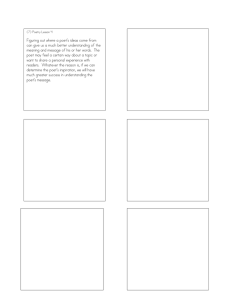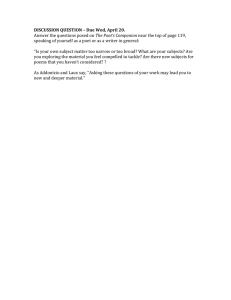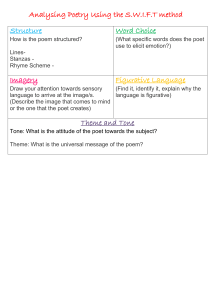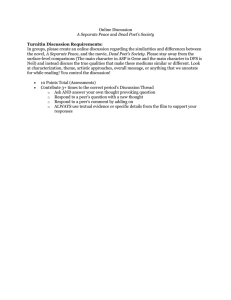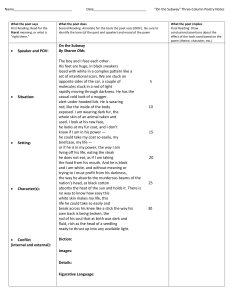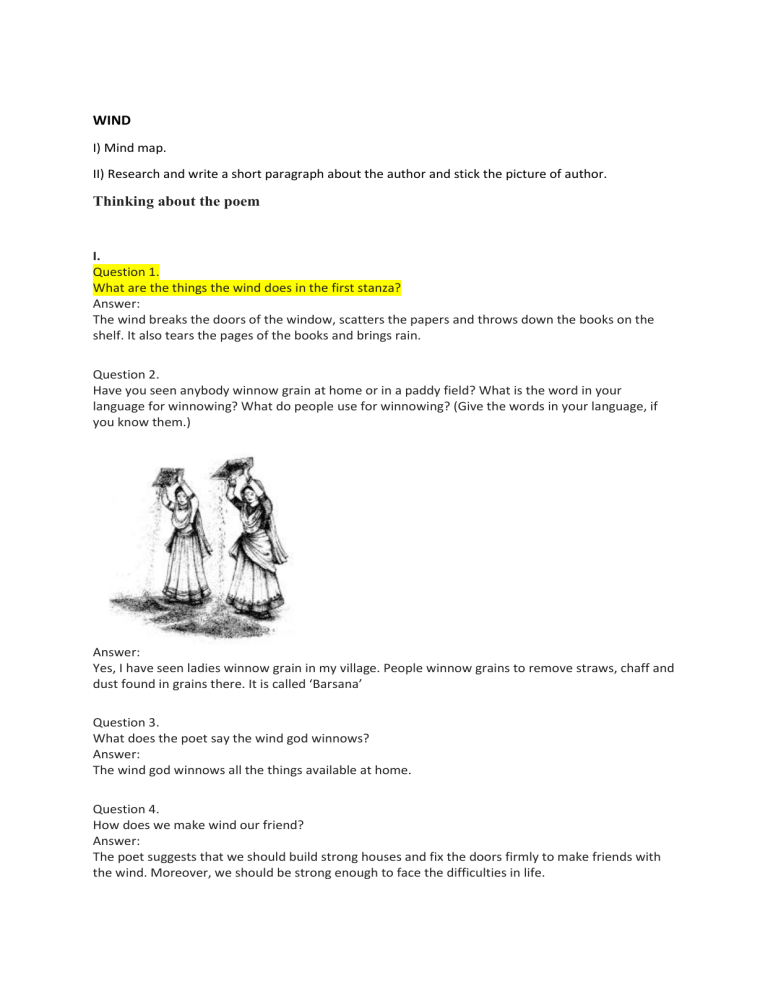
WIND I) Mind map. II) Research and write a short paragraph about the author and stick the picture of author. Thinking about the poem I. Question 1. What are the things the wind does in the first stanza? Answer: The wind breaks the doors of the window, scatters the papers and throws down the books on the shelf. It also tears the pages of the books and brings rain. Question 2. Have you seen anybody winnow grain at home or in a paddy field? What is the word in your language for winnowing? What do people use for winnowing? (Give the words in your language, if you know them.) Answer: Yes, I have seen ladies winnow grain in my village. People winnow grains to remove straws, chaff and dust found in grains there. It is called ‘Barsana’ Question 3. What does the poet say the wind god winnows? Answer: The wind god winnows all the things available at home. Question 4. How does we make wind our friend? Answer: The poet suggests that we should build strong houses and fix the doors firmly to make friends with the wind. Moreover, we should be strong enough to face the difficulties in life. Question 5. What do the last four lines of the poem mean to you? Answer: The last four lines convey the message that those who are not determined and lack confidence face defeat. And those who set their targets and make sincere efforts are not disturbed by any obstacle. Question 6. How does the poet speak to the wind—in anger or with humour? You must also have seen or heard of the wind “crumbling lives”. What is your response to this? Is it same as the poets? Answer: The poet speaks to the wind with humour. I opine that the poet’s behaviour is pertinent and I have also seen the wind devastating the property mercilessly. The poet invites the wind to attack him and intends to prepare himself for the attack. Question 7. Who are disturbed by the wind? Answer: The wind disturbs only those people who are not determined. The self-confident people overcome the obstacles put before them by the wind. The wind does not have the knack to disturb the peace of mind of such people. The wind blows out weak fires and makes strong fires roar and flourish. Question 8. What does the wind do with the books? Answer: The wind tears the pages off and throws them down from the book shelf. The potent (powerful) wind scatters the books and sheets of paper on the floor. It disturbs everything. Question 9. Why does the author ask the wind to come swiftly? Answer: The author asks the wind to come swiftly so that the earthly peace and order can be retained. The wind damages the shutters of the windows, scatters the papers and tears the pages of books. It disturbs everything and everyone. So, the poet pleads for the welfare of the society. Question 10. How does the wind become the cause of rain? Answer: The wind sometimes becomes violent and appears to be a storm. It brings clouds with it from distant lands. There is no need to say that clouds bring rain. It is a universal truth and scientific fact that clouds bring rain from the blue sky. Question 11. Why should the earthly people build strong houses? Answer: They should build strong houses so that they may not be damaged by the wind. They should be strong enough to endure violent winds and become a challenge to the potent wind. Question 12. Does the wind god do what we tell him? Answer: The wind god is all powerful. He is not influenced by any external factors. He doesn’t do what we tell him to do. Neither our requests nor our commands will influence him. He is mighty and sweeps away all weaklings with him. He loves strength and befriends with strong and steadfast hearts. Question 13. What does the wind symbolise? Answer: The wind symbolises the raw and brutal power of nature. The wind god is a symbol of might and strength. He hates weaklings. He rather pokes fun at them. Be they are frail houses, crumbling doors or crumbling hearts and bodies, he spares none. He befriends only the strong. Question 14. What does the poet ask us to do? Answer: The poet wants us to realise the true nature and power of the wind. He advises us to build strong homes. The doors must be closed firmly. Weak hearts will never succeed. Let us make our heart strong and steadfast. The wind god leaves strength and steadfastness. Question 15. Why and how does the wind blow out weak fires? Who roar and flourish? Answer: The god of wind is against any and every shaky and weak thing. Our heart should be fired with determination and strength. Weak fires and weaklings are flown out. Only the strong roar and flourish. His friendship is good rewarding. Let us praise the wind, the symbol of power and strength. Question 16. Why does the poet suggest the people that they have to be strong? Write your answer in the context of the poem, ‘Wind’. Answer: According to the poet, the wind is very powerful. It has power to break the shutters of the windows, scatter the papers and throw the books down the shelf. When it blows violently, it brings the clouds. It mocks at the weak and destroys their homes. The weak persons are really helpless before the wind. But the poet is quite hopeful. He thinks that when the people build strong houses, they can challenge the wind. Actually, the poet suggests the people that they should be strong at heart because the weak persons cannot face the challenges of life. Only the people with strong hearts have the courage to face the challenges of life. Question 17. How can you say that the poet of the poem ‘Wind’ is a great lover of mankind? Answer: The poet wants to make people strong at hearts. His desire is that they should be bold enough to face the challenges of life. When we have strong houses, we can protect ourselves from the angry wind. In the same manner when we are strong at heart, we can face the challenges of life. Only the weak persons are defeated by the problems of life. Similarly, the poet wants that people should face the challenges of life and make their life happy. His thought shows that he is really a great humanist. His heart is filled with compassion for mankind. Question 18. The wind is a symbol of power and strength. How can we be friend it and survive in our struggle for existence? Answer: The wind symbolises the uncontrollable and raw power of nature. The wind god symbolises strength and steadfastness. Weaklings who are weak in the mind and body are swept away by the mighty power of the wind. Only those who are blessed with steadfast minds and hearts survive in the bitter struggle of life. The poet gives a broader message. Whatever we do or think must stand on the foundations of strength and power. Only strong minds and bodies can face the anger of the wind and challenges of life. We can befriend the god of wind by building strong homes and doors. We can also win his favour by firming the body and making the heart steadfast. Question 19. Why does the poet suggest the people that they have to be strong? Write your answer in the context of the poem, ‘Wind’. Answer: According to the poet, the wind is very powerful. It has power to break the shutters of the windows, scatter the papers and throw the books down the shelf. When it blows violently, it brings the clouds. It mocks at the weak and destroys their homes. The weak persons are really helpless before the wind. But the poet is quite hopeful. He thinks that when the people build strong houses, they can challenge the wind. Actually, the poet suggests the people that they should be strong at heart because the weak persons cannot face the challenges of life. Only the people with strong hearts have the courage to face the challenges of life.
